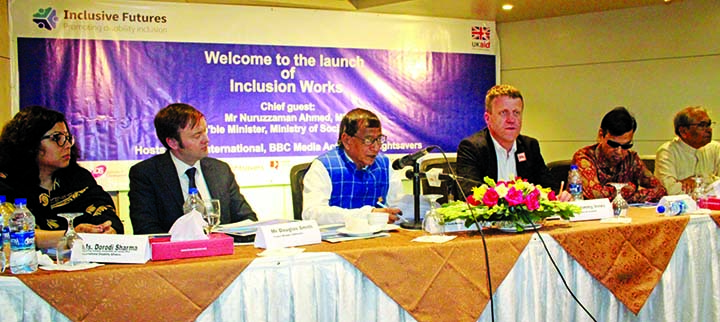
Staff Reporter :
Social Welfare Nuruzzaman Ahmed on Tuesday said that the present government is working to lessen barriers to create formal employment opportunities for youth with disabilities.
The minister made the comment while speaking at launching of the “Inclusion Works” programme held at BRAC Centre Inn in the capital.
He acknowledged that in the competitive labour market, entrance of young people with disabilities is a big challenge for the country and it becomes even more challenging when they lack adequate and appropriate skills, knowledge and information required for employment, especially in the formal sector.
“However, some initiatives by both the government and private sectors are contributing to lessen the number of barriers, particularly innovative programme like this one will help to create formal employment opportunities for youth with disabilities,” Nuruzzaman said.
He further said the government is committed to attain the targets of SDGs and no one will leave behind.
In his opening remarks, Khondoker Ariful Islam, Sightsavers Country Director, mentioned that Bangladesh is losing 1.7 percent of its GDP due to the exclusion of people with disabilities from the labour market and the cost of exclusion, due to forgone income from a lack of schooling and employment both for people with disabilities and their caregivers, is estimated at US $1.2 billion annually.
When they have access to skills training, they can significantly contribute to the rising demands of skilled labour, which provides considerable economic advantages for them, their families and the country, he added.
Mr Douglas Smith, Project Manager, said in his project brief that Inclusion Works is a Sightsavers led, UK aid-funded consortium of 11 partners to include people with disabilities in formal employment in Bangladesh, Kenya, Nigeria and Uganda. In Bangladesh, ADD International, BBC Media Action and Sightsavers, along with their partners, are working together for the programme.
Operating over three years, the programme will create and test innovative approaches to improve the long-term economic inclusion of people with disabilities in the country.
For this, the consortium will work directly with disabled people’s organisations (DPOs), NGOs and prospective employers to demonstrate ways to include people with disabilities in the workplace on an equal basis with others. It will also demonstrate the UK government’s commitment to inclusive development by ensuring that people with disabilities are central to international development policymaking and programmes.

